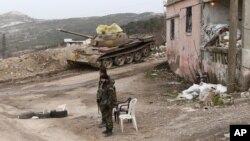Major world powers are urging that political momentum be seized following the U.N.’s announcement that Syrian talks would begin Friday in Geneva.
“There has not been this level of diplomatic activity over Syria since the last round of talks in Geneva in 2014,” Britain’s U.N. Ambassador Matthew Rycroft said Tuesday during the Security Council’s regular meeting on the situation in the Middle East. “It is in all our interests to maintain the momentum, to build on the optimism.”
Staffan de Mistura, the U.N. special envoy for Syria, announced that invitations had been sent out for the talks between the Syrian government and opposition. He did not elaborate on who the participants would be. Questions remain particularly around who will make up the opposition delegation.
Earlier, the opposition comprising the recently formed High Negotiations Committee cast doubt on whether it would go to Geneva, accusing the United States of adopting unacceptable Iranian and Russian ideas for solving the conflict.
Opposition official Asaad al-Zoubi told Arabic news channel Al-Hadath that he was pessimistic, but that a final decision had yet to be taken.
‘Uphill battle’
The talks are expected to start with the parties in separate rooms and U.N. mediators shuttling between them. De Mistura said these so-called proximity talks were scheduled to continue for six months, with the first round lasting two or three weeks.
He said Monday that it would be “an uphill battle,” but “the important thing is that we keep the momentum.”
U.S. Ambassador Samantha Power told the council that the continued “suffering and barbarity” in Syria highlighted the urgency of working toward a political solution for the nearly five-year-old conflict.
“The initiation of U.N.-facilitated Syrian negotiations to reach a political transition, in accordance with the Geneva Communique, is a critical step toward ending the conflict in Syria,” she said.
The Geneva Communique, agreed to at an international peace conference in June 2012, is a six-point plan for stopping the violence and moving the two sides toward a political settlement, including the establishment of a transitional governing body that would “exercise full executive powers.”
‘Window of opportunity’
Russian envoy Vitaly Churkin, speaking of the coming Geneva talks, said "there is a unique prospect that’s been created” to reach a political settlement. “We must take this window of opportunity.”
In late September, Russia began airstrikes in Syria, saying President Bashar al-Assad had requested Moscow’s help to battle the self-proclaimed Islamic State group. But members of the large Western anti-IS coalition have criticized the Russian strikes, saying the vast majority have been against launched in armed-opposition areas.
“We have heard different ideas regarding Russia’s activities in Syria,” Churkin told the council. “We decisively push them back, in particular from sides who are part of the Western coalition.” He criticized the Western coalition, saying its air forces were not acting transparently or effectively, especially in reporting civilian casualties.
Objectives
France’s U.N. Ambassador Francois Delattre stressed that there must be progress on three fronts if the Geneva negotiations are to be successful: improving the humanitarian situation, letting the opposition choose its own representatives for the talks, and including the political transition in the discussions.
“Only a political solution,” Delattre said, “will put an end to the suffering and the ongoing outgo of civilians and reduce the terrorist threat we all face.”
Diplomacy has repeatedly failed to resolve the Syrian conflict, which has killed 250,000 people and forced millions from their homes, spawning a refugee crisis in neighboring states and Europe. De Mistura is the third international envoy for Syria. His two predecessors — Kofi Annan and Lakhdar Brahimi — both quit.
The United States has supported the opposition to Assad, who it says has lost legitimacy and must leave power. But the opposition has been increasingly critical of U.S. policy. Opposition leader Riad Hijab said earlier this month that the United States had backtracked on its position on Syria, softening its stance to accommodate Russia.
Russia has sought to expand the opposition delegation to peace talks to include a powerful Kurdish faction that controls wide areas of northern Syria. The Sunni Arab opposition says the Kurdish PYD party should be part of the government delegation. PYD leader Saleh Muslim said he expected his party to be invited to Geneva, though it was unclear in what capacity.
Participation of Kurds
Russian Foreign Minister Sergei Lavrov said on Tuesday it would be impossible to reach a peace agreement in Syria without inviting Kurds to take part in the negotiating process.
The Syrian Kurds say the autonomous government they have established in the northeast is a decentralized model for how to resolve the war.
Turkey, a major sponsor of the insurgency, said however that it was against the participation of the Kurdish YPG militia, which is affiliated with the PYD. The YPG has become an important partner in the U.S.-led fight against Islamic State. Turkey views the YPG as an extension of the PKK, which it sees as a terrorist organization.
The Syrian government and its allies have made significant gains against rebels in western Syria in recent weeks.
On Monday, they captured the rebel-held town of Sheikh Maskin in southern Syria near the border with Jordan. It was the first significant gain for Damascus in that area since the start of the Russian intervention on September 30.
In recent weeks government forces and their allies have also captured two strategic towns in the northwestern province of Latakia, where they are trying to seal the border to cut insurgent supply lines to Turkey.
Some information for this report came from Reuters.




